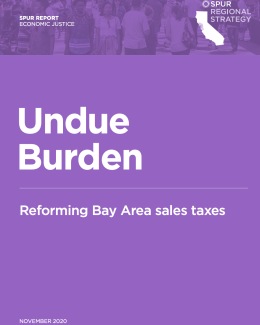Sales taxes are a common revenue-raising tool, made all the more appealing as the COVID-19 pandemic creates desperate budget shortfalls for cities and counties. But they also play a role in reinforcing structural inequality. Every consumer pays the same tax rate at the register, but low-income households pay a higher percentage of their income because they have fewer resources to begin with. SPUR’s new briefing paper, Undue Burden: Reforming Bay Area sales taxes, analyzes the impact of state and local sales taxes (as of April 2020) on Bay Area households. We found that the lowest income households pay three times as much of their income as wealthier households. The financial impact hits the thousands of Bay Area households living paycheck to paycheck, particularly Black households and other households of color who are overrepresented at the low end of the income spectrum.
SPUR has long advocated for and supported sales taxes to fund public services, particularly transportation. We acknowledge that in doing so, we have helped perpetuate their inequitable impacts. As supporters of taxation for the public good, we take responsibility for better understanding the impact of sales taxes and helping to promote policies that mitigate their inequitable impacts. Undue Burden explores three options for instituting a low-income sales tax credit or supplement to help create a more equitable tax code.

